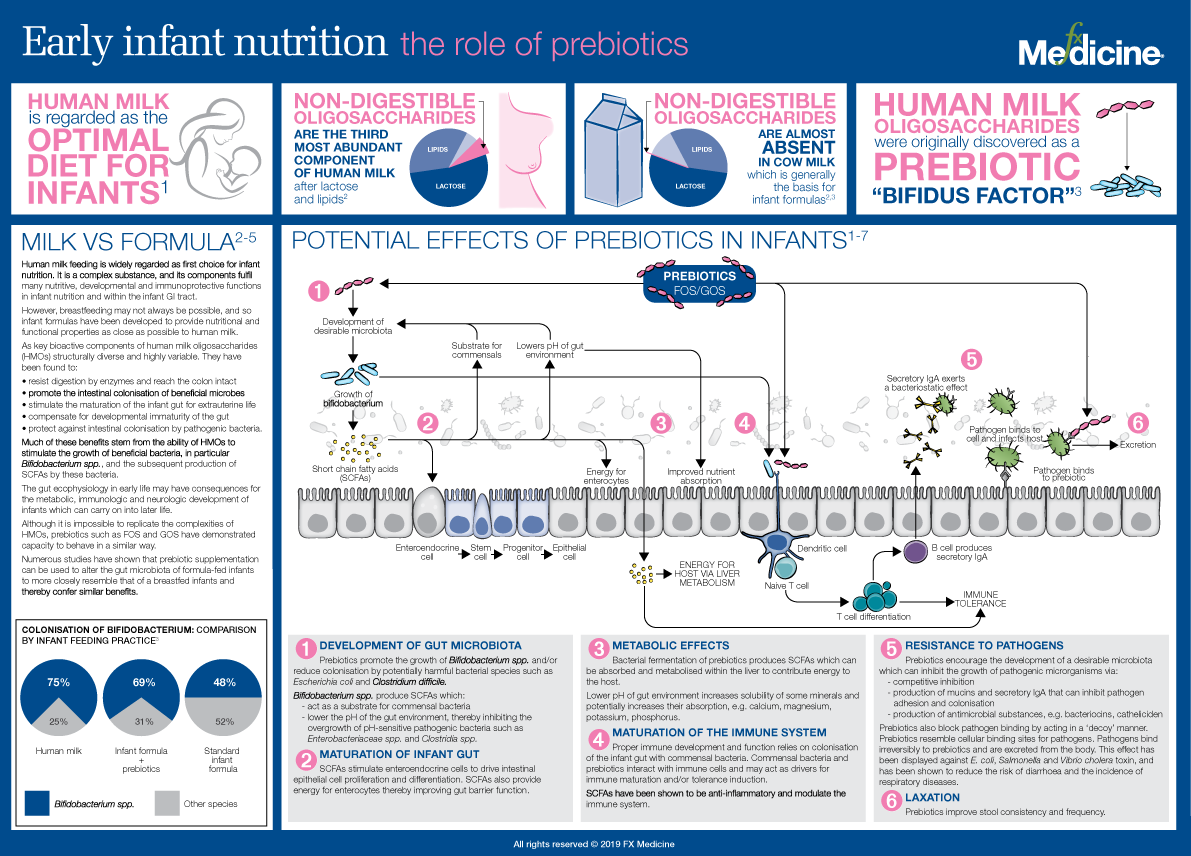
The intestinal microbiota of infants is a critical component in the development of digestive and immune functions. As the baby’s immune system continues to mature, the innate immune system takes most of its cues from the intestinal bacteria.
Current research indicates that a healthy infant microbiome is required to modulate Th1 and Th2 immune responses and promote the healthy production of secretory IgA, a critical immunoglobulin secreted into the lumen of the gut which is responsible for important non-inflammatory immune functions. These factors are all required for minimising the risks associated with the development of allergy and autoimmune diseases.
While providing healthy bacteria to the baby is necessary for proper colonisation of the gut, another important factor is an adequate supply of prebiotics. Prebiotics influence the composition and activity of the gastrointestinal microbiota, which in turn can have a major effect on the immune system that may be sustained throughout life. As well as this, prebiotics have been shown to be beneficial for the maturation of the infant gut, nutrient absorption and metabolism, resistance to pathogens and optimal digestive function.
In this infographic we explore the research that indicates that prebiotics, such as fructo-oligosaccharides (FOS) and galacto-oligosaccharides (GOS), play an important role in early nutrition and the impact of prebiotics on the development and modulation of the infant immune system.
References
- Donovan SM, Wang M, Li M, et al. Host-microbe interactions in the neonatal intestine: role of human milk oligosaccharides. Adv Nutr 2012;3(3):450S-455S. [Full text]
- Bode L. Human milk oligosaccharides: every baby needs a sugar mama. Glycobiol 2012;22(9):1147-1162. [Full text]
- Oozer R, van Limpt K, Ludwig T, et al. Intestinal microbiology in early life: specific prebiotics can have similar functionalities as human-milk oligosaccharides. Am J Clin Nutr 2013;98(2):561S-571S. [Full text]
- Sanchez M, Panahi S, Tremblay A. Childhood obesity: a role for gut microbiota? Int J Environ Res Public Health 2015;12(1):162-175. [Full text]
- Bruggencate SJ, Bovee-Oudenhoven IM, Feitsma AL, et al. Functional role and mechanisms of sialyllactose and other sialylated milk oligosaccharides. Nutr Rev 2014;72(6):377-389. [Abstract]
- Wang M, Li M, Wu S, et al. Fecal microbiota composition of breast-fed infants is correlated with human milk oligosaccharides consumed. J Pediatr Gastroenterol Nutr 2015;60(6):825-833. [PDF]
- Wu S, Grimm R, German JB et al. Annotation and structural analysis of sialylated human milk oligosaccharides. J Proteome Res 2012;10(2):856-868. [Full text]
This image by FX Medicine is licensed under a Creative Commons Attribution-NonCommercial-NoDerivatives 4.0 International License.
More information about how to share/use the infographics for personal use.
If you interested in using any FX Medicine content for commercial use please contact us.
DISCLAIMER:
The information provided on FX Medicine is for educational and informational purposes only. The information provided on this site is not, nor is it intended to be, a substitute for professional advice or care. Please seek the advice of a qualified health care professional in the event something you have read here raises questions or concerns regarding your health.



